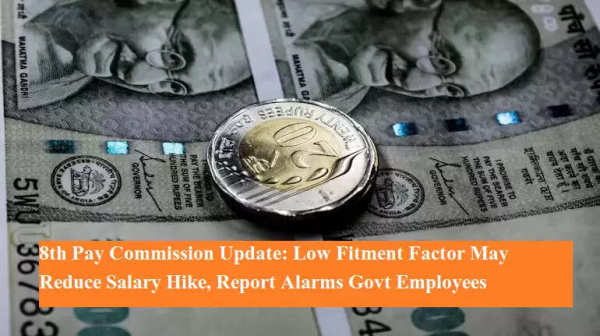
8th Pay Commission Update: New Report Sparks Concern Among Central Government Employees and Pensioners
The long-awaited 8th Pay Commission, which was first hinted at in January 2025, is yet to be officially constituted, leaving central government employees and pensioners in anticipation. However, a recent report by Kotak Institutional Equities has delivered unsettling news to those expecting a significant hike in their salaries and pensions. The report suggests that the fitment factor, a critical component that determines salary adjustments under the new pay commission, might be considerably lower than anticipated — potentially reducing the expected increment.
Kotak Institutional Equities estimates that the fitment factor under the 8th Pay Commission could be set at 1.8, significantly lower than the 2.57 factor used in the 7th Pay Commission. This lower multiplier would translate to a modest 13% average salary hike, far less than what many employees were hoping for. According to the report, the minimum basic pay might increase from ₹18,000 to approximately ₹30,000. While this is a notable jump, it pales in comparison to earlier expectations of a more generous revision.
If these projections turn out to be accurate, the impact will be significant, affecting nearly 33 lakh central government employees, with Grade C employees—who make up around 90% of the workforce—seeing the most direct effect. This segment, comprising clerical and support staff, was expecting more substantial gains due to their relatively lower pay structure.
The fitment factor is the formula used to calculate the revised basic salary of government employees under a new pay commission. For example, under the 7th Pay Commission, the fitment factor was 2.57. So, if an employee had a basic pay of ₹18,000, it was revised to ₹46,260. This multiplier applies only to the basic pay and is a vital component of salary restructuring. A lower fitment factor directly limits the magnitude of pay hikes, making it a closely watched figure among government employees.
While pay commissions are typically implemented every 10 years, the 8th Pay Commission is expected to come into effect from January 2026. Despite its announcement earlier this year, no official committee has yet been formed. According to Kotak's analysis, the government still needs to appoint commission members and define their Terms of Reference (ToR)—the detailed guidelines under which the commission will operate.
Looking back at the 7th Pay Commission, the entire process—from the formation of the committee to report submission and final implementation—took about 2 years. If the 8th Commission follows a similar trajectory, its implementation might stretch into late 2026 or early 2027. However, once it is enforced, any delay is likely to be compensated with arrears, providing backdated financial benefits to employees and pensioners from January 2026.
Government employees and retirees had been calculating potential raises and financial gains ever since talks of the new pay commission surfaced. The hope was for a substantial upward revision in line with inflation and cost of living. However, the possibility of a reduced fitment factor has tempered these expectations, sparking widespread discussion and concern within the public sector.
With inflation and living expenses on the rise, many were counting on the 8th Pay Commission to provide real relief. The Kotak report, though not final, has triggered anxiety that the upcoming pay revision may fall short of those expectations.
While nothing is official yet, the report from Kotak Institutional Equities has certainly stirred the waters. Government employees and pensioners now face renewed uncertainty over the scope of their expected salary increases. The central government, meanwhile, is under pressure to accelerate the process and bring clarity regarding the constitution, timeline, and methodology of the 8th Pay Commission.
As the wait continues, all eyes are now on the Centre's next move — will it provide a more generous revision than projected, or will the concerns raised in this report become a reality? Only time will tell.